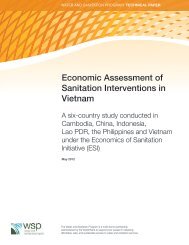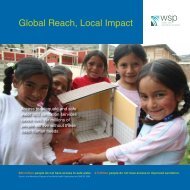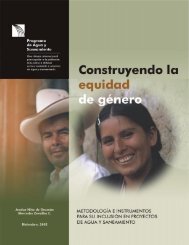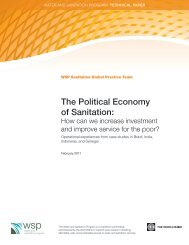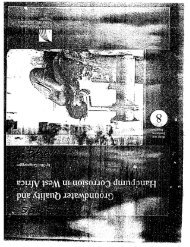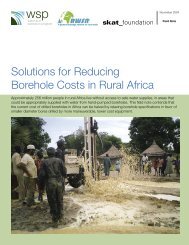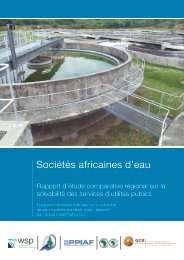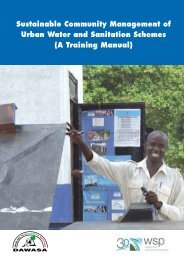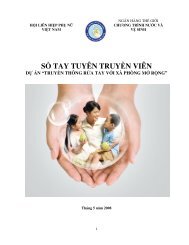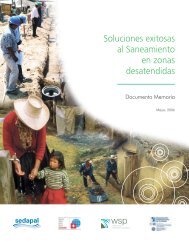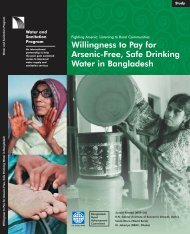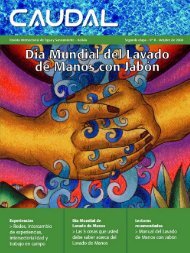AcknowledgementsThe Participatory Learning <strong>and</strong> ActionInitiative (PLAI: 1998-2000) broughttogether a global core group* ofindividuals <strong>and</strong> agencies into a partnership, whichcontinues to work together for mainstreaminggender, <strong>and</strong> poverty concerns in water supply <strong>and</strong>sanitation.This resource guide on the Methodology forParticipatory Assessment (MPA) is a product of thatpartnership between the Water <strong>and</strong> SanitationProgram <strong>and</strong> the IRC International Water <strong>and</strong>Sanitation Centre. The Initiative, funded by thegovernments of Canada, The Netherl<strong>and</strong>s,Norway, Sweden <strong>and</strong> the Africa region of theUNDP, concluded in early 2000 with thedevelopment of the gender-poverty-mainstreamingmethodology, its validation through a global studyin 15 countries, <strong>and</strong> the production of trainingmaterials <strong>and</strong> country reports.Thereafter MPA has steadily gained popularity withsector stakeholders as country governments,external support agencies, national NGOs <strong>and</strong>training institutions in Asia, Africa <strong>and</strong> LatinAmerica have discovered its potential <strong>and</strong> investedin building capacities for its use. They have fundedthe development of MPA applications tailored totheir country contexts, languages <strong>and</strong> learningneeds, allowing the global WSP-IRC core team tofurther refine the methodology <strong>and</strong> integrate itwith institutional <strong>and</strong> policy reform efforts in agrowing number of countries. This resource guidedraws upon the learning gained in the post-PLAIperiod, by <strong>and</strong> with government <strong>and</strong> NGO partneragencies in Indonesia, Lao PDR, Cambodia,Vietnam, The Philippines, Peru, Bolivia, India,Nepal, Benin, Tanzania <strong>and</strong> Ug<strong>and</strong>a. Externalfunding for these MPA applications came fromthe governments of Australia, Canada, Denmark,Germany, Luxembourg, Sweden, The Netherl<strong>and</strong>s<strong>and</strong> the United Kingdom.This book draws substantially upon its predecessor,the MPA Metguide published in 2000 <strong>and</strong> coauthoredby the present editors with Rekha Dayal.However, it is not merely a new edition of theMetguide. It is a synthesis of learning gainedthrough field applications by MPA practitionersacross the world, all of whom have contributed toits evolution to the current state as described inSection 1 of this book. Several of them have also* Global steering group of PLAI: Bruce Gross, Christine van Wijk, Rekha Dayal, Nilanjana Mukherjee, RoseLidonde, Noma Musabayane, Suzanne Reiff, Jennifer Francis, Shalini Sinha. A.J. James joined the group in 1999.vi
penned case studies of MPA applications forSection 2, namely, Bruce Gross, Suzanne Reiff,Nina Shatifan, Soutsakhone Chanthaphone,Santanu Lahiri <strong>and</strong> Richard Hopkins.We deeply appreciate the support of themanagements of the Water <strong>and</strong> SanitationProgram (WSP) <strong>and</strong> IRC. Specifically, we wouldlike to express our thanks to Jamal Saghir, Director,Energy <strong>and</strong> Water Department, the World Bank;Walter Stottmann, Manager, WSP <strong>and</strong>Parameswaran Iyer, Senior WSS Specialist, WSP,for having faith that this product will be of valueto sector professionals <strong>and</strong> therefore providingfunds for its preparation. Our grateful thanks aredue to Caroline van den Berg <strong>and</strong> Richard Pollard,the past <strong>and</strong> present Regional Team Leaders ofWSP-East Asia (where most of the drafting <strong>and</strong>editing was done), for their keen interest, valuableadvice <strong>and</strong> dem<strong>and</strong> for rigor. Funds received fromthe World Bank for printing the book are gratefullyacknowledged.Within IRC, Jennifer Francis <strong>and</strong> Maria Lucia Borbawere co-developers from the first hour onwards,later joined by Leonie Postma, Francois Brikke,Corine Otte <strong>and</strong> Michelle Moffat in NEWAH. JanTeun Visscher, Director IRC <strong>and</strong> Eveline Bolt, Headof Research, ensured that the work was includedin IRC’s long-term program. Special thanks alsogo to Mariela Garcia Vargas in CINARA, whosecritical review was the basis for continued operation<strong>and</strong> documentation.The MPA flag-bearers who have led countryspecificoperationalization from within WSP areRose Lidonde <strong>and</strong> Suzanne Reiff in WSP - Africa<strong>and</strong> Indrawati Josodipoero, SisavanhPhanouvong <strong>and</strong> Hoa Hoang Thi in WSP - EastAsia <strong>and</strong> the Pacific. Bruce Gross, former PLAInitiative team leader, has contributed greatlythrough deepening his h<strong>and</strong>s-on involvementwith MPA in East Asia following his retirementfrom the World Bank. Peter Feldman (Partnersfor Development) <strong>and</strong> Bouy Kim Sreang haveopened up MPA chapters with sector partners inCambodia.We owe much to our peer reviewers MichaelBamberger (retired Senior Sociologist, Gender<strong>and</strong> Development Group, World Bank), JosetteMurphy Malley (ex- Senior Evaluation Specialist,ARD, World Bank) <strong>and</strong> Wendy Wakeman(Senior Community Development Specialist,PRMGE, World Bank). Their incisive comments,valuable criticism, detailed scrutiny <strong>and</strong>thought-provoking questions helped usimmensely in bringing greater clarity <strong>and</strong>balance to our work.All the photographs used in the book excepttwo were contributed by MPA practitioners <strong>and</strong>enthusiasts including Bruce Gross, LeoniePostma, Ratna Indrawati Josodipoero, DeviAri<strong>and</strong>y Setiawan, Kumala Sari, ThomasMeadley, Nina Shatifan, Suzanne Reiff, AndrewWhillas, SAWAC (NGO in Cambodia), CINARA(Columbia), NEWAH (Nepal) <strong>and</strong> the editors ofthis book.Finally, <strong>and</strong> most importantly, we acknowledgewith the deepest gratitude the time, energy,enthusiasm <strong>and</strong> resources contributed bythous<strong>and</strong>s of women <strong>and</strong> men in poor rural <strong>and</strong>urban communities participating in MPAassessments worldwide, who are sharing their life’sexperiences <strong>and</strong> views with MPA practitioners, thusproviding a wealth of learning for implementingagencies, policy <strong>and</strong> decision makers <strong>and</strong> fundingagencies. We sincerely hope that they themselvesare deriving adequately worthwhile returns fromthe process, both in the short <strong>and</strong> the long run.Nilanjana MukherjeeChristine van Wijkvii




